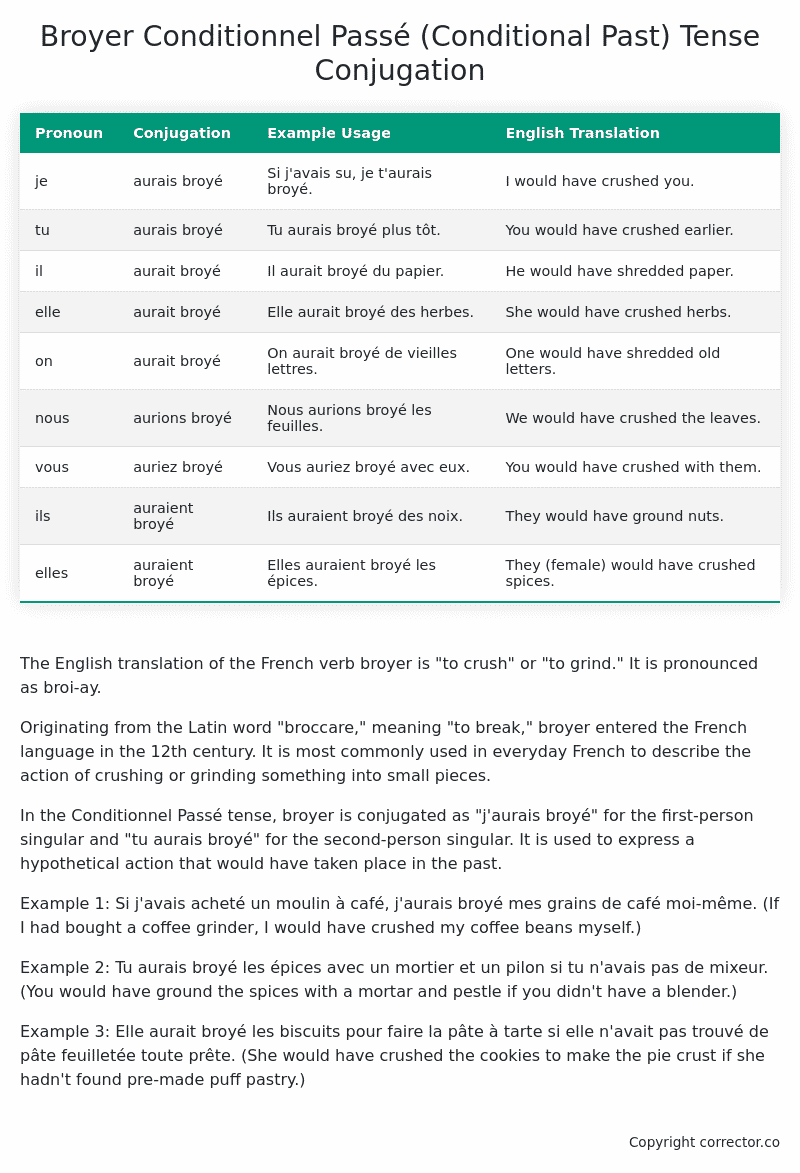Conditionnel Passé (Conditional Past) Tense Conjugation of the French Verb broyer
Introduction to the verb broyer
The English translation of the French verb broyer is “to crush” or “to grind.” It is pronounced as broi-ay.
Originating from the Latin word “broccare,” meaning “to break,” broyer entered the French language in the 12th century. It is most commonly used in everyday French to describe the action of crushing or grinding something into small pieces.
In the Conditionnel Passé tense, broyer is conjugated as “j’aurais broyé” for the first-person singular and “tu aurais broyé” for the second-person singular. It is used to express a hypothetical action that would have taken place in the past.
Example 1: Si j’avais acheté un moulin à café, j’aurais broyé mes grains de café moi-même. (If I had bought a coffee grinder, I would have crushed my coffee beans myself.)
Example 2: Tu aurais broyé les épices avec un mortier et un pilon si tu n’avais pas de mixeur. (You would have ground the spices with a mortar and pestle if you didn’t have a blender.)
Example 3: Elle aurait broyé les biscuits pour faire la pâte à tarte si elle n’avait pas trouvé de pâte feuilletée toute prête. (She would have crushed the cookies to make the pie crust if she hadn’t found pre-made puff pastry.)
Table of the Conditionnel Passé (Conditional Past) Tense Conjugation of broyer
| Pronoun | Conjugation | Example Usage | English Translation |
|---|---|---|---|
| je | aurais broyé | Si j’avais su, je t’aurais broyé. | I would have crushed you. |
| tu | aurais broyé | Tu aurais broyé plus tôt. | You would have crushed earlier. |
| il | aurait broyé | Il aurait broyé du papier. | He would have shredded paper. |
| elle | aurait broyé | Elle aurait broyé des herbes. | She would have crushed herbs. |
| on | aurait broyé | On aurait broyé de vieilles lettres. | One would have shredded old letters. |
| nous | aurions broyé | Nous aurions broyé les feuilles. | We would have crushed the leaves. |
| vous | auriez broyé | Vous auriez broyé avec eux. | You would have crushed with them. |
| ils | auraient broyé | Ils auraient broyé des noix. | They would have ground nuts. |
| elles | auraient broyé | Elles auraient broyé les épices. | They (female) would have crushed spices. |
Other Conjugations for Broyer.
Le Present (Present Tense) Conjugation of the French Verb broyer
Imparfait (Imperfect) Tense Conjugation of the French Verb broyer
Passé Simple (Simple Past) Tense Conjugation of the French Verb broyer
Passé Composé (Present Perfect) Tense Conjugation of the French Verb broyer
Futur Simple (Simple Future) Tense Conjugation of the French Verb broyer
Futur Proche (Near Future) Tense Conjugation of the French Verb broyer
Plus-que-parfait (Pluperfect) Tense Conjugation of the French Verb broyer
Passé Antérieur (Past Anterior) Tense Conjugation of the French Verb broyer
Futur Antérieur (Future Anterior) Tense Conjugation of the French Verb broyer
Subjonctif Présent (Subjunctive Present) Tense Conjugation of the French Verb broyer
Subjonctif Passé (Subjunctive Past) Tense Conjugation of the French Verb broyer
Subjonctif Imparfait (Subjunctive Imperfect) Tense Conjugation of the French Verb broyer
Subjonctif Plus-que-parfait (Subjunctive Pluperfect) Tense Conjugation of the French Verb broyer
Conditionnel Présent (Conditional Present) Tense Conjugation of the French Verb broyer
Conditionnel Passé (Conditional Past) Tense Conjugation of the French Verb broyer (this article)
L’impératif Présent (Imperative Present) Tense Conjugation of the French Verb broyer
L’infinitif Présent (Infinitive Present) Tense Conjugation of the French Verb broyer
Struggling with French verbs or the language in general? Why not use our free French Grammar Checker – no registration required!
Get a FREE Download Study Sheet of this Conjugation 🔥
Simply right click the image below, click “save image” and get your free reference for the broyer Conditionnel Passé tense conjugation!

Broyer – About the French Conditionnel Passé (Conditional Past) Tense
Formation
Common Everyday Usage Patterns
Expressing Unreal Past Scenarios
Polite Requests or Suggestions
Expressing Doubt or Uncertainty
Interactions with Other Tenses
Conditional Present
Indicative Past Tenses
Conditional Future
Summary
Want More?
I hope you enjoyed this article on the verb broyer. Still in a learning mood? Check out another TOTALLY random French verb conjugation!


